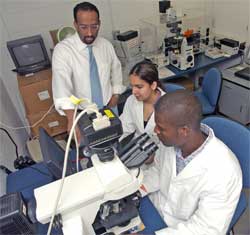
URI pharmacy professor researches lead exposure, builds bridges between U.S. and Middle East in Yemen
KINGSTON, R.I. – February 28, 2007 – Nasser Zawia’s year-long Fulbright fellowship in Yemen ended last year, but the associate professor of pharmacy continues work with the country’s scientists and officials on infant exposure to lead and other biomedical research.
A leading researcher on the link between infant lead exposure and Alzheimer’s disease, Zawia spent the 2005-2006 academic year as a Fulbright fellow in the country at the tip of the Arabian Peninsula.
“My job in Yemen had two elements,” said the toxicology expert and Warwick resident. “First I expanded research I’ve done at URI and second, I helped build bridges between the U.S. and Mideast.”
Zawia’s work was at the heart of the Fulbright program. Fulbright Scholars are selected on the basis of academic or professional achievement and for their extraordinary leadership potential. The Fulbright Program is sponsored by the U.S. Department of State, Bureau of Educational and Cultural Affairs.
His trip to Yemen gave him the opportunity to conduct many lectures and collaborate with graduate students in their research on exposure to lead and other toxins. “I helped five students write their theses regarding the effects of lead exposure,” said Zawia.
One student’s thesis was about Khat, a flowering tree that is very similar to coca leaves. Khat is an abused substance that is chewed to induce its euphoric effects like manic behaviors and hallucinations. Although it is not addictive, some long-term effects include negative impacts on liver function and susceptibility to ulcers.
Another student’s thesis focused on acrylamide , a carcinogen found in low concentrations when food is cooked in oil. Zawia and the student are analyzing its content and studying the toxicity on brain cells.
“We have a lot of freedom to conduct our research, which allows us to investigate a wide range of topics that are important to both Yemenis and Americans,” said Zawia.
He also spent much time in Yemen and surrounding countries trying to strengthen their relationship with the United States. “My focus is to try and counteract stereotypes and present a side of America they might be unaware of,” said Zawia. “It’s the aspect of America that shares scientific knowledge and a willingness to help so that people from around the world can benefit.
He has traveled to other countries such as Saudi Arabia, Qatar, and Egypt as part of his mission to promote understanding and to foster improved health. “I want to try and create an impact on these countries, helping to develop polices and trends for the future,” said Zawia. “Few people come and talk to the residents of these countries, so they have little knowledge of other policies outside of their own.”
Zawia thinks that because he was born in Yemen, people will be more likely to open up to him. “It allows for us to freely exchange ideas and provides opportunities to form bonds of trust,” Zawia said.
One of the vehicles that has lead to Zawia’s success is the American Association of Yemeni Scientists and Professionals, a group whose goal is to create a network for highly educated and professional Yemenis around the world. The association, which Zawia directs, has most recently started a program that provides books, equipment, and supplies to Yemeni universities.
Zawia’s future work has him continuing to support education in Yemen. He is still in contact with those he has worked with and is still gaining information on his various research projects. He also has an upcoming conference in Washington D.C. in April entitled “Shaping the Future of Yemenis Through Education.”
Media Contact: Dave Lavallee, 401-874-5862

